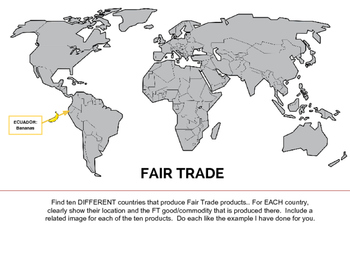Fair trade human geography represents an intriguing intersection between economic exchanges and human relationships within geographical contexts. This concept urges us to rethink the integrity of our global economy. At its core, fair trade embodies a commitment to equitable trading practices that prioritize not merely profit but also the wellbeing of producers and communities, particularly in developing nations. The significance of fair trade in human geography extends far beyond simple commerce; it invites individuals to reassess the effects of their consumption patterns and the global network of relationships that underpin them.
The essence of fair trade is rooted in its ethical framework. Traditional trade often perpetuates cycles of inequity, where wealth is concentrated in the hands of a few, leaving the majority in precarious conditions. Fair trade, conversely, seeks to establish social equity by ensuring that farmers and producers receive a fair price for their goods. This creates a ripple effect, leading to enhanced living standards, education, healthcare, and sustainable practices. It becomes evident that the ramifications of these choices are far-reaching, affecting not just local economies but also international relations and environmental sustainability.
Understanding the geographic implications of fair trade necessitates a dive into the concept of scale. Local, national, and global scales play pivotal roles in shaping the dynamics of trade. Fair trade works from the grassroots level; local producers often join cooperatives, which can wield more power collectively than individually in market negotiations. These cooperatives not only secure better prices for goods but often invest in community development projects, fostering a sense of solidarity and shared purpose among members.
Moreover, the localization of production significantly impacts carbon footprints. By promoting shorter supply chains and direct trade relationships, fair trade endeavors alleviate the significant carbon emissions associated with long-distance transport. As consumers become increasingly aware of their ecological impact, they are drawn to the promise of fair trade. The question of sustainability inevitably arises: How can we balance consumer demand with environmental stewardship? Fair trade offers a pragmatic yet optimistic answer to this conundrum.
The principles of fair trade establish an ethical baseline that connects consumers with producers. A new narrative emerges — one that emphasizes shared humanity over transactional relationships. In a world rife with globalization, where products often traverse continents with little transparency, fair trade champions the restoration of direct connections. It implores consumers to recognize the stories behind their purchases. Who grew this coffee? What journey did these bananas undertake? Through fair trade practices, we cultivate an informed consumer base that understands the broader implications of their choices.
Education plays a significant role in this transformative shift. Fair trade organizations frequently engage in community outreach, emphasizing the importance of responsible consumption and its multifaceted impacts. By informing consumers about the socioeconomic landscapes from which their products emerge, fair trade nurtures a culture of curiosity and awareness. The inherent complexities of human geography unfurl as individuals explore the intersecting realms of culture, economy, and environment.
Furthermore, fair trade does not exist in a vacuum. It challenges prevailing models of capitalism, urging a reevaluation of success metrics. Rather than focusing solely on economic growth, the fair trade movement encompasses concepts of social welfare and environmental health as essential components of comprehensive progress. As societies grapple with the urgent challenges posed by climate change, fair trade emerges as a model that intertwines sustainability with social advocacy.
In addition to connectivity and education, fair trade robustly engenders a shift in power dynamics within market systems. Traditional trade structures often favor multinational corporations at the expense of local producers. By asserting the rights of small-scale farmers and artisans, fair trade levels the playing field, fostering a more inclusive economic environment. By participating in fair trade practices, consumers actively participate in the distinction of transformative power as they opt for products that reflect not just commodity value but also a commitment to equity and justice.
The economic ripple effects of fair trade extend to local and global scales. Communities that embrace fair trade often perceive increased economic resilience due to diversified income sources and reduced dependency on volatile markets. This stability engenders a deeper investment in local ecosystems, as producers and communities can prioritize sustainable agricultural practices without the existential threat of market fluctuations undermining their livelihoods. Furthermore, as fair trade continues to expand, it cultivates opportunities for innovation in sustainable practices and elevates voices that have historically been marginalized.
Despite these promising developments, challenges remain. The fair trade movement is sometimes criticized for its limitations, including disparities in certification standards and the potential for ‘fairwashing.’ However, understanding these complexities reveals room for continuous improvement and dialogue within the movement itself. As consumers become increasingly discerning, there is a distinct opportunity to engage in conversations that lead to even greater accountability and transparency.
Ultimately, embracing fair trade human geography paves the way for a more humane global society. It provokes curiosity about the factors shaping our world and the interconnectedness of our choices. As individuals engage with fair trade, they embark on a journey of awareness, contribution, and transformation that transcends geographical boundaries. In doing so, fair trade not only fosters economic empowerment but nurtures our collective potential to craft a more just and sustainable future.
In conclusion, fair trade human geography is more than an economic concept; it represents a fundamental shift in perception and engagement with both the global economy and the environment. By allowing the principles of fair trade to guide our consumption habits and advocacy efforts, we can contribute to a world where equity reigns, and the human experience is enriched through thoughtful connection and equitable exchange.
